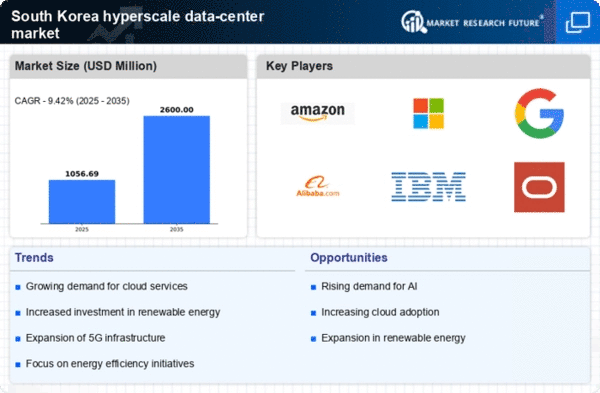Expansion of 5G Networks
The rollout of 5G networks in South Korea significantly impacts the hyperscale data-center market. With the advent of 5G technology, data transmission speeds are expected to increase dramatically, leading to a higher volume of data generated and processed. This technological advancement is projected to boost data consumption by over 30% in the coming years. Consequently, hyperscale data centers must adapt to accommodate this influx of data traffic. The hyperscale data-center market is likely to see increased investments in infrastructure to support 5G applications, including IoT devices and smart city initiatives. As businesses and consumers alike embrace 5G capabilities, the demand for scalable and efficient data-center solutions will continue to rise, driving growth in the sector.
Emergence of Edge Computing
The rise of edge computing is reshaping the hyperscale data-center market landscape in South Korea. As businesses seek to reduce latency and improve response times, the demand for localized data processing solutions is increasing. Edge computing allows data to be processed closer to the source, minimizing delays associated with traditional data-center models. This shift is expected to drive a growth rate of around 25% in edge computing deployments, influencing the design and operation of hyperscale data centers. The hyperscale data-center market must evolve to integrate edge computing capabilities, ensuring that they can support distributed architectures effectively. This trend not only enhances operational efficiency but also aligns with the growing need for real-time data processing in various sectors, including manufacturing and healthcare.
Increased Focus on Cybersecurity
As cyber threats become more sophisticated, the hyperscale data-center market in South Korea is witnessing an increased focus on cybersecurity measures. Organizations are prioritizing the protection of sensitive data, leading to heightened investments in security technologies and protocols. The market for cybersecurity solutions is expected to grow by approximately 20% annually, reflecting the urgency of safeguarding data assets. This trend compels hyperscale data centers to implement advanced security frameworks, including encryption, intrusion detection systems, and multi-factor authentication. The hyperscale data-center market must adapt to these evolving security demands, ensuring that their infrastructures are resilient against potential breaches. As a result, the emphasis on cybersecurity not only enhances data protection but also fosters trust among clients and stakeholders.
Rising Demand for Data Processing
The hyperscale data-center market in South Korea experiences a notable surge in demand for data processing capabilities. As businesses increasingly rely on data analytics and real-time processing, the need for robust infrastructure becomes paramount. This trend is evidenced by a projected growth rate of approximately 15% annually in data traffic, necessitating the expansion of data-center facilities. Companies are investing heavily in advanced technologies to enhance processing speeds and efficiency. The hyperscale data-center market is thus positioned to benefit from this rising demand, as organizations seek to optimize their operations and leverage data for strategic decision-making. Furthermore, the integration of artificial intelligence and machine learning into data processing workflows is likely to further drive the need for expansive data-center resources.
Sustainability Initiatives and Energy Efficiency
Sustainability initiatives are becoming a central focus for the hyperscale data-center market in South Korea. As environmental concerns rise, companies are increasingly adopting energy-efficient practices and renewable energy sources. The market is witnessing a shift towards green data centers, with a projected increase of 40% in investments aimed at reducing carbon footprints. This trend is driven by regulatory pressures and consumer demand for environmentally responsible practices. The hyperscale data-center market is thus compelled to innovate in energy management, utilizing technologies such as advanced cooling systems and energy-efficient hardware. By prioritizing sustainability, data centers not only comply with regulations but also enhance their competitive edge in a market that values eco-friendly solutions.
















